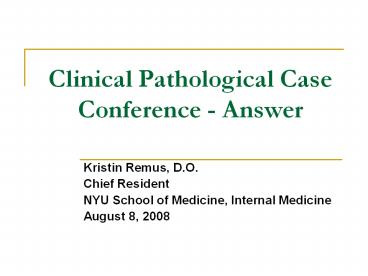Clinical Pathological Case Conference - Answer - PowerPoint PPT Presentation
Title:
Clinical Pathological Case Conference - Answer
Description:
Innumerable sessile colonic Polyps with tubulovillous adenoma and eosinophilic infiltrate ... Polyp growth. Unknown disease. process? Follow Up ... – PowerPoint PPT presentation
Number of Views:323
Avg rating:3.0/5.0
Title: Clinical Pathological Case Conference - Answer
1
Clinical Pathological Case Conference - Answer
- Kristin Remus, D.O.
- Chief Resident
- NYU School of Medicine, Internal Medicine
- August 8, 2008
2
Radiology
- Review of Radiology showed the following
- Normal Chest x-ray
- Lung nodule on Chest CT
- Normal Abdominal CT
3
(No Transcript)
4
(No Transcript)
5
(No Transcript)
6
A diagnostic test was performed Endoscopy and
Colonoscopy with biopsies
7
(No Transcript)
8
(No Transcript)
9
(No Transcript)
10
(No Transcript)
11
Further Studies
- Stool contained Strongyloides Stercoralis larva
- Endoscopic studies did not show stigmata of
recent bleeding - Lab tests
- HIV negative
- Lymph node biopsy was not performed
- The patient had been offered screening
colonoscopy 1 year prior and declined. - Biopsies negative for H. pylori
12
Additional Lab Results
Purkinje Cell Ab - negative Hu immunoreactivity
negative Anti-ganglioside IgM lt1800 Anti-ganglios
ide IgG lt1100
Iron ug/dL 70 (42-146) TIBC ug/dL 189
(250-450) Ferritin ng/mL 186.7 (22-322) Retic
3.77 (0.5-1.55) Retic Index 2
PSA ng/mL 0.44 (0-4) CEA ng/mL lt0.5 (lt5) CA-125
U/mL 14.2 (lt35) AFP ng/mL 1.5 (0-10) Serum ACE
U/L 19 (9-67) Serum immunofixation faint bands
in IgG, IgM, and Kappa are present against a
dense, polyclonal background.
13
Strongyloides Stercoralis
- Tropical Asia, Africa, Latin America, Southern
US, Eastern Europe - May persist asymptomatically in host for up to 65
years - Risk factors for clinical manifestation
- Chronic disease Diabetes, Kidney Disease,
Alcoholism - Immunosuppression
- Hematologic malignancies
- Malnutrition
- HTLV-1 infection
- Diagnosis
- Parasite found in feces, sputum, duodenal
aspiration, CSF, tissue biopsy
14
Strongyloides Life Cycle
parthenogenesis
FECES
SOIL
infective larvae
15
Strongyloides Stercoralis
- Clinical Presentation
- Skin
- larva currens
- GI tract
- Cramps, diarrhea
- Malabsorption
- Rarely massive hemorrhage
- Immunosuppressed
- Fever
- Lungs
- larvae in sputum
- Many fatalities reported
Cutaneous larva currens, racing larva
16
Stronglyoides Infection
- Immunosuppresion
- Steroids may mimic endogenous parasitic-derived
regulatory hormone - More eggs produced in the presence of exogenous
steroids - Hyperinfection
- Disseminated infection
- Treatment
- oral Ivermectin 200 ug/kg daily x 2 days,
Albendazole as alternative - Prevention
- CDC recommends oral Ivermectin 200 ug/kg daily x
2 days for prevention in immunosuppressed - In a least one study, Thiabendazole was no more
effective than placebo
17
Chronic Acquired Demyelinating Polyneuropathy
(CADP)
- A group of peripheral nerve disorders
- Chronic Inflammatory Demyelinating Polyneuropathy
(CIDP) is a type of CADP - Peak incidence 40 to 60 years, male predominance
- Pathophysiology unclear
18
CIDP Diagnostic Features
- Symmetric proximal and distal muscle weakness
- /- sensory loss
- Loss of deep tendon reflexes
- Progressive or relapsing
- Time course at least 2 months
- Diagnosis
- Cerebral spinal fluid
- Albuminocytologic disassocation
- Nerve conduction studies
- Biopsy
19
Concurrent Illness Variants of CIDP
- Several systemic disorders can occur with CIDP
- HIV, Hep C
- Lymphoma, Myeloma, MGUS
- Inflammatory Bowel Disease
- Connective Tissue Diseases
- Diabetes Mellitus, Thyrotoxicosis
- Nephrotic Syndrome
- Obligation to search for underlying cause
20
CIDP Clinical Course
- Therapy
- IV Immunoglobulin (IVIg)
- Repeated infusions, usually 1 course/month
- Corticosteroids
- Starting dose 100 mg Prednisone per day
- Tapered with clinical improvement
- Plasmapheresis
- Progression with IV IgG or Prednisone
- Immunosuppressives
- Mycophenolate mofetil, Cyclosporine, Methotrexate
21
Acquired Ichthyosis
- Acquired or Genetic
- Acquired usually due to drugs or systemic disease
- Rhomboid, or fish-like, scales on the skin
- Symmetric, ranges in severity
- Primarily affects trunk, limbs, and extensor
surfaces - Absence of inflammatory infiltrate with
hyperkeratosis is present on skin biopsy
22
Acquired Icthyosis
- Most commonly associated with Hodgkins Disease
or and non-Hodgkins lymphoma - Also seen with
- Transitional cell carcinoma, leiomyosarcoma,
Kaposis Sarcoma, HCC, breast, lung, ovarian
cancers - Dermatomyositis
- AIDS, HTLV-1
- Sarcoidosis
- Thyroid disease
- Malnutrition/Malabsorption
- Cholesterol-lowering drugs such as Statins and
Niacin - No report of association with Strongyloides
- Obligation to look for underlying cause
23
Final Diagnosis
- Strongyloides Stercoralis
- invading stomach
- Chronic Active Gastritis
- Innumerable sessile colonic Polyps with
tubulovillous adenoma and eosinophilic infiltrate
24
Proposed Pathogenesis
Unknown disease process?
Acquired CIDP
?
Acquired Strongyloides infection
Acquired Icthyosis
Chronic Illness, Malnutrition
Disseminated Infection
High Dose Steroids
? Polyp growth
GI Bleeding Gastritis Anemia ? Malabsorption
25
Follow Up
- The patient was seen in Neurology clinic 3 weeks
ago. - His symptoms have dramatically improved.
- The rash is also improving.
- He has had no further evidence of GI bleeding.
- He will likely begin Azathioprine for his CIDP
once the Strongyloides infection is fully
resolved.
26
Thank you!Dr. Martin BlaserDr. Charles Hazzi
Dr. Herman YeeDr. Michael MacariDr. Emma
RobinsonDr. Jonathan Ralston Dr. Philip
TiernoDr. Gerald VillaneuvaDr. Malini SahuDr.
Christina Yoon































